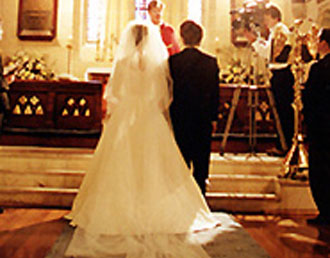 As early as the sixteenth, up to the nineteenth century, marriages were arranged by parents or guardians. The bride and bridegroom often were not acquainted until their marriage. The parents often made the marriage arrangements and betrothals while the bride and bridegroom were small children (ages three to seven). The children would continue to live with their own parents and meet from time to time for meals or holiday celebrations.
As early as the sixteenth, up to the nineteenth century, marriages were arranged by parents or guardians. The bride and bridegroom often were not acquainted until their marriage. The parents often made the marriage arrangements and betrothals while the bride and bridegroom were small children (ages three to seven). The children would continue to live with their own parents and meet from time to time for meals or holiday celebrations.
These prearranged marriages came under fire in the late seventeenth century when a judge held that betrothals and marriages prior the age of seven were "utterly void". However, they would be valid if, after the age of seven, the children called each other husband and wife, embraced, kissed each other, gave and received Gifts of Token.
Later, young couples ran away and had a ceremony privately performed without banns or license. These elopements and private ceremonies represented the beginning of a revolt against parental control of marital selection.
The Civil Marriage Act of 1653, passed by the Puritans under Cromwell, required a civil ceremony before a justice of the peace after presentation of the certificate from the parish register that banns had been published. If either party were under twenty-one, proof of parental consent must also be presented. The wedding ceremony consisted of a simple formula to be repeated by the man and woman and was accompanied by hand fastening. The use of a ring was forbidden.
By the Hardwicke Act of 1753, all weddings, except members of the royal family, were to be performed only after publication of banns or issuance of a license, only during the morning hours of eight to twelve, only in an Anglican Church or chapel, and only before an Anglican clergyman. Two or more witnesses were required and a register must be kept. Parental consent was demanded unless the banns had been published.
The Catholic Church, in the Council of Trent, restated its position that marriage was one of the seven sacraments and therefore could not be dissolved.
Up until the early 1990's, it was very difficult to get married in Great Britain. If one wishes to marry in England or Wales, they must do so in a church which has a register, (which is like a special license), and they can do so only in the district (shire) where one of the couple resides. All Church of England parishes (Anglican) are automatically registered, regardless of their size. No blood tests or counseling are required.
Present Day Wedding Traditions
Brides have "Hen' nights and bridegrooms have "Stag" parties similar to bachelor/bachelorette parties. There are ceremony rehearsals, but no rehearsal dinner.
If the couple will marry in a church, banns announcing the proposed wedding are read aloud in the church three Sundays before the wedding. It is unlucky for the bride and bridegroom to be present at the calling of the banns.
Weddings are traditionally held at noon; afterward there is a seated luncheon, called a "wedding breakfast".
Invitations to the wedding are similar to the United States' customs, but few people would go the expense of calligraphy addressing. Response cards are not used; guests purchase their own individual reply cards.
It is good luck for a chimney sweep to kiss the bride when she comes out of the church.
点击查看本频道更多精彩内容